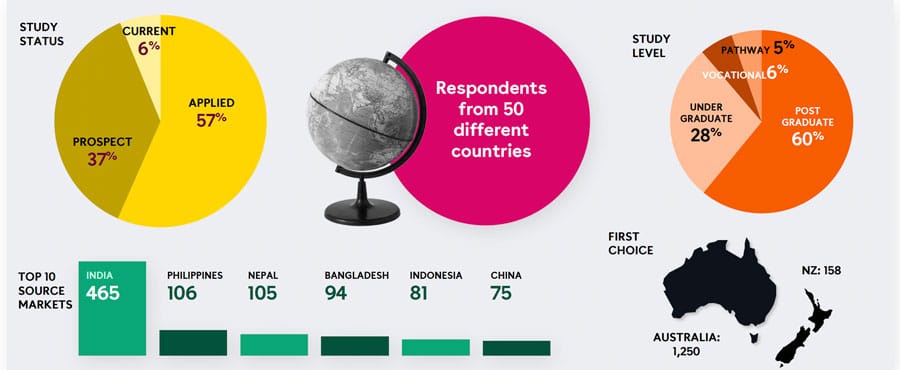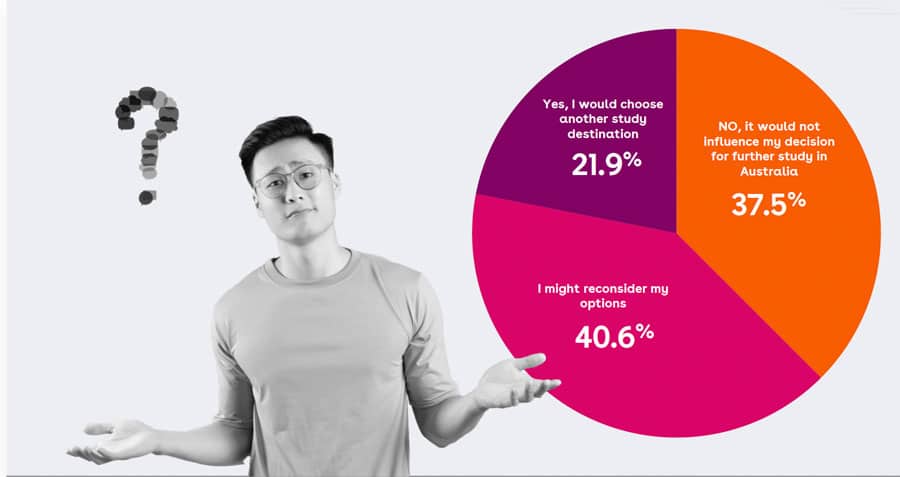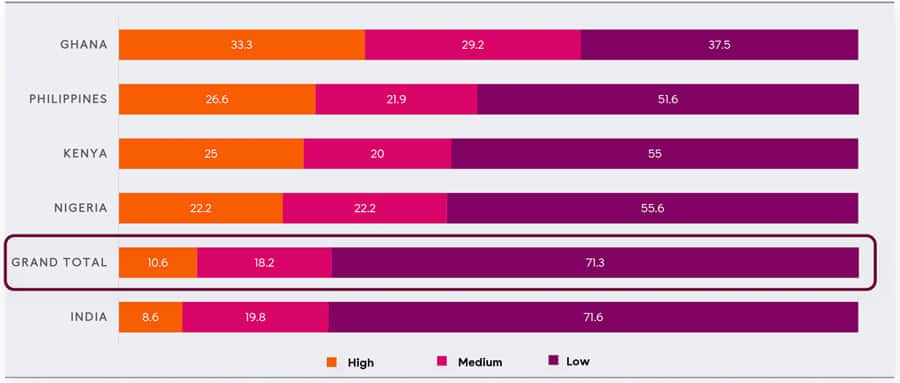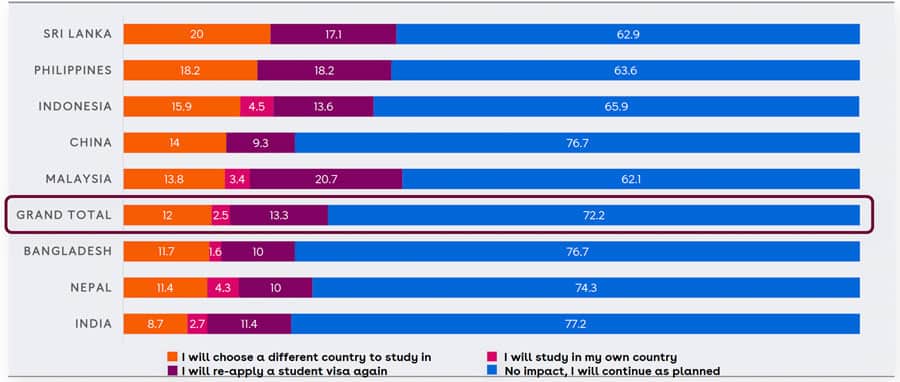Pulse survey indicates early impact of new financial requirements for Australian study visas
- An IDP survey finds that reactions are varied across key student sending markets to Australia’s tighter immigration rules and higher financial requirements and visa fees
- The findings suggest, however, that increased financial requirements and application fees could influence the study plans of half (or more) of prospective students
Responding to an IDP Pulse survey conducted in June 2024, a large proportion of Chinese and Indian prospective students and applicants said their study plans would be affected by Australia's visa fee hike, higher savings threshold, and high visa rejection rates. Similarly, many respondents from other Asian and African countries said they were now thinking twice about studying in Australia.
IDP’s survey went out to over 1,400 international students, most of whom were exploring postgraduate options (60% versus 28% undergraduate, with the remainder looking at pathway and vocational options). The respondent pool was heavily weighted to India, with one third of respondents coming from this key sending market.

What do students make of the new savings threshold required for Australian student visas?
Overall, about three-quarters of surveyed students were aware that students must now show savings of AUD$29,710 (US$19,537) to be eligible for a study visa for Australia, which is much higher than the requirement in other destinations (e.g., it is US$5,000 more than what students must show for a Canadian study permit). Awareness rose to about 90% in India and Nepal but was much lower in Ghana (45%) and Taiwan (40%).
Just over half of the responding students (53%) said the new threshold would not change their intention to study in Australia, leaving nearly half saying it might change their decision. This average belies extremes across sending markets. For example, in more price-sensitive markets such as Cambodia and the Philippines, about three-quarters of students said the new requirement will impact their decision about whether to study in Australia. By contrast, only 27% of Chinese and 15% of Taiwanese students said they would change their study plan because of the savings requirement.
Will the new, non-refundable application fee of AUD$1,600 deter potential students?
Effective 1 July 2024, the Australian government raised the visa application fee to AUD$1,600, representing a 125% jump from the previous fee of AUD$710.
The IDP survey results require more interpretation in this respect because the students responded in June 2024, ahead of the actual fee announcement. The student respondents would not have known, at that time, the scale of the increase announced on 1 July.
Even so, the survey did find that a significant proportion of prospective students would reconsider their choice of destination as a result of a fee hike (whatever the exact amount). As the following chart illustrates, nearly two-thirds of prospects (63%) said they “would” or “might” change their study plans. That number would likely have been larger still if the students were asked to respond to an actual 125% increase in the visa fee.

Again, there are significant variations by sending market: about half of prospective Chinese and Indian students said they wouldn't change their intention to study in Australia, but more than 7 in 10 students from the Philippines, Malaysia, and Vietnam said they might. The Philippines and Vietnam are Top 10 sending markets for Australian institutions, so this finding is particularly worrisome. Students in other price-sensitive markets were also notably affected by the prospect of a higher fee: at least 40% of Kenyan, Nepali, Pakistani, and Ghanaian students saying said an increase in visa fees would impact their study plans.
New Zealand stands to gain
New Zealand, with its highly ranked universities and relative proximity to Asian markets, is looking more attractive to many prospective students in the wake of the recent Australian savings and fee hike announcements. More than 4 in 10 Pakistani and Filipino students said they were highly influenced by the relative affordability of a New Zealand visa versus an Australian one, and this rises to over 7 in 10 Ghanaian and 8 in 10 Egyptian students.
The fact that New Zealand currently requires AUD$10,000 less in financial savings than Australia does is also very much on the minds of Ghanaian, Filipino, Kenyan, and Nigerian students, as shown in the following chart.

New Zealand’s expansion of its Green List of priority skills – which opens the door for more international students to gain a post-study work visa – is also very attractive to some students. Overall, a third of students said the expanded Green List would influence their choice of degree or destination, rising to 45%, 50%, and 57% in the Philippines, Indonesia, and Malaysia, respectively.
New Zealand has also announced that the partners of students at the bachelor’s level or above in degrees linked to the Green List are now eligible for a work visa with open conditions, and that the children of Green List-oriented students do not have to pay international student tuition fees. These provisions are also very likely to increase New Zealand’s attractiveness to international students.
Visa rejections won’t deter most students from trying again to study in Australia
On average, about 1 in 6 survey respondents had been rejected for a study visa (for Australia or elsewhere) or had seen their friends/family receive a rejection. However, more than 7 in 10 prospective students said they would continue as planned to try to get a visa for study abroad, and very few said they would study in their own country as a result of a visa rejection.

For additional information, please see:


















